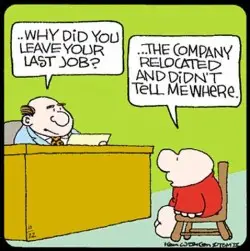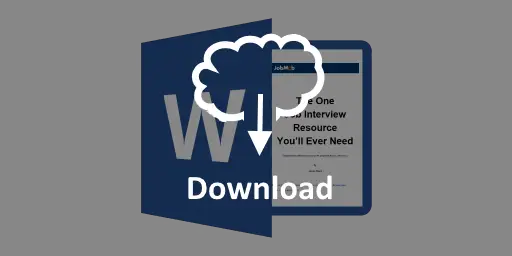8 tips for getting over every job seeker’s worst nightmare.

This is a guest post by Nisa Chitakasem. If you’d also like to guest post here on JobMob, follow these guest post guidelines.
It’s every job seeker’s worst nightmare.
You’re in an interview for a job you really want and it all starts going wrong.
Whether it’s your phone ringing or you giving the longest, most irrelevant answer to an interview question ever, once things start going wrong it feels like there’s no way back.
But there is.
It is possible to get things back on track and limit the damage during the actual interview. There are also some follow-up steps you can take after the event to rectify the situation and to move on with your job search regardless of what the outcome of the bad interview is.
Free bonus: The One Job Interview Resource You’ll Ever Need is a handy reference to help you prepare for any kind of job interview. Download it free now
During the Interview
Don’t panic
Even if you’re convinced you’ve made a massive mistake in the middle of your interview, keep calm and carry on. The interviewers may not have even noticed, or if they have, they may be willing to allow it depending on how the rest of the interview goes.
Control your emotions
Even if you feel like bursting into tears because the interview is going so badly, keep yourself in check. Keep things in perspective—it’s only one job interview, not a fight to the death. If you really are emotional, excuse yourself to the bathroom so you can take a moment.
Avoid dwelling on your mistake
Yes, you made a mistake, but if you keep thinking about it for the rest of the interview, you’ll be distracted and that will make matters worse. Put the mistake out of your head by listening carefully to what the interviewers are saying. This will help you remain in the moment instead of thinking about what just happened.
Don’t try too hard
If you overcompensate your error by trying too hard, you’ll tighten up and will probably go on to make more mistakes. Instead, focus on executing your original game plan for the interview and try to keep your breathing even.
After the Interview
Do NOT vent online
You may think there’s no way in a thousand years that interview landed you the job, but that’s still not an excuse to jump on Facebook and rant about the experience. Firstly, you never know- the interviewers may still be considering you and therefore may be monitoring your social media presence to see if you’re professional online. Secondly, other employers you’ve applied to may also be checking your online profiles.
Send a ‘thank you’ note
No matter how embarrassed you are after the bad interview, take the time to at least email a ‘thank you’ note to the interviewers. It can’t logically make matters worse and is a simple sign of acknowledgement and politeness or at worst, just think of sending a ‘thank you’ note as an act of closure.
Get in touch with new thoughts
The last thing you may want to do after a disastrous interview is to email the interviewers with new thoughts or ideas about the interview topics. However, by emailing them with things that occurred to you after the event, you may be able to salvage the situation. In the clear light of day, your thoughts will be more lucid and can give the interviewers a more accurate idea of who you really are.
Move on
Focus on the other job applications you’ve made and how you’re going to improve upon your interview technique. If learning from your interview mistakes helps you to ace the next interview you get, the bad interview will have been worth something.
Free BonusIf you want a handy job interview resource that you can keep on your smartphone or print out for easy reference, I’ve got a special bonus for you.
This free download contains:- 165 positive personality adjectives to describe yourself
- 444 of the most popular job interviewer questions to prepare yourself with
- 175 questions that you can ask in job interviews to make a good impression and learn about your future employer

JobMob Insiders can get this free bonus and other exclusive content in the JobMob Insider Bonuses area. Join now, it's free!
About the author
Nisa Chitakasem is the founder of Position Ignition – a careers company dedicated to taking you to the next step in your career. For free advice, guidance and information on careers visit the Position Ignition Career Blog or find Nisa on Twitter @PosIgnition or Facebook. And for tips specifically on job interviews, see Position Ignition’s eBooks Getting Started with Interviews and How to Ace the Interview.
If you found this article useful, read next these 7 Company Research Tips Before The Job Interview.
Subscribe to JobMob via RSS or email and follow me on Twitter for more ideas about getting over job interviews gone bad.




More good advice on this topic:
Rescuing A Failing Interview: Why You Call Halt & Start Again
Hi Nisa,
Thanks for sharing these useful tips on how to recover quickly from a bad interview.
Once one has applied the first 7 you listed, I think the moving on part is an especially important piece to work on and it takes some time…This is because it involves a few steps:
1) reviewing your mistakes and seeing what you can learn from them
2) acknowledging that you may have indeed lost your chance for this particular job as a result of your mistake(s) and to find a way to avoid beating yourself up for this
Perhaps one way to assist in part 2 of moving on is to look at the mistake as being an indication that perhaps this particular job was not really meant for you, that it was not a really good fit for you so that it is ok that things did not work out.
That things will work out when the job you are interviewing for is right for you…
Thanks,
Dorlee
Dorlee- it’s a good point. Depending on what the interview-killing mistake was, it might just be proof that you shouldn’t have been there in the first place.
One of my first job interviews was in Montreal, and I had claimed on my CV that I was perfectly bilingual (French-English). Heck, I thought I was. Well, not quite. One of the first questions the interviewer asked me was a relatively basic one – how to say a certain term in French – that any French speaker in that industry would know. I didn’t, and it was all downhill from there. If I’d had a better measure of my French level at the time and said so on the CV, that interview would have never occurred.
Hi Nisa,
I liked your blog but want to add something here… Due to the economy I think employer behavior has gotten worse regarding interviews… common respect for time (especially for those who are employed) and listening to a prospective candidate’s goals needs to be respected and it’s not currently… things have gotten worse in the economy… I think if more people ask for respect of their time … it would not be a bad idea instead of moving on…
Another strategy to recover from an interview mistake is to revisit your answer. Answer the current question and then say, “my earlier answer on the worst boss I ever had, in thinking further about my answer, I’d have to say…” Now give them the best answer that you had prepared for, and move on. Thank the interviewer for allowing you to amend an earlier answer.
Pingback: Spotlight Ideas » Top 100+ Blog Articles on Career / Job Advice
Pingback: Thanking: The Simplest Personal Branding Tactic | Personal Branding Blog - Dan Schawbel
Pingback: Some links to get you through the weekend ... | Job Stalker
Pingback: One Man's Trash is Another Man's Gold | CareerAlley
Pingback: Guilty Until Proven Innocent | Daily Career Connection
Pingback: 3 Simple Ways to Get Resume Responses and Company Feedback | JobMob
Pingback: Guilty Until Proven Innocent | CollegeRecruiter.com
Pingback: One Man’s Trash is Another Man’s Gold - CollegeRecruiter.com
Pingback: Follow-up or Follow Up? Improve Your Post-Interview Technique | JobMob
Pingback: Thanking: The Simplest Personal Branding Tactic | JobMob
Thanks for reminding all of us that no bad experience need leave emotional scars.
Pingback: No BS Career Advice: July 10, 2024
Pingback: No BS Career Advice: July 10, 2024 – Go Job Zone